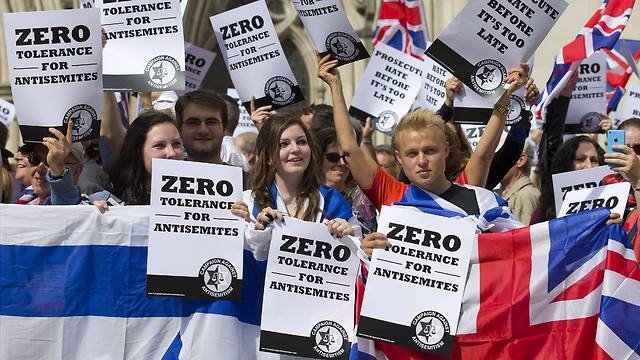Anti-Semitism: UK to adopt controversial definition to stop hate crimes

Britain is set to announce plans to adopt a controversial new definition of anti-Semitism, which includes some criticism of Israel within its scope, in a bid to counter the rise in hate crimes against Jewish people.
It means the UK will become the first country in the world to adopt the definition coined by the Berlin-based International Holocaust Remembrance Alliance (IHRA).
READ: Criticising Israeli policies 'not anti-Semitism': UK MPs' report
According to the IHRA definition, anti-Semitism “is a certain perception of Jews, which may be expressed as hatred towards Jews. Rhetorical and physical manifestations of anti-Semitism are directed toward Jewish or non-Jewish individuals and/or their property, toward Jewish community institutions and religious facilities.”
In further guidance it also defines comparing Israeli state policy to that of the Nazis and "claiming that the existence of a State of Israel is a racist endeavour" as anti-Semitic.
However it also states: "Criticism of Israel similar to that levelled against any other country cannot be regarded as anti-Semitic."
Downing Street in a statement on Monday said that the definition will be used by government agencies and police to identify and combat incidents of anti-Semitism.
Fears definition could silence critics
The plans come after the police recorded a 62 percent increase in incidents of anti-Semitism across Britain during the last year.
Last week a man who launched an anti-Semitic rant against Jewish MP Luciana Berger on Twitter was convicted of racially aggravated harassment and jailed for two years.
Theresa May, in a pre-released statement to Reuters, said the definition was adopted to "ensure that culprits will not be able to get away with being anti-Semitic because the term is ill-defined, or because different organisations or bodies have different interpretations of it”.
According to The Jewish Chronicle, Jewish groups across Britain have welcomed the government's adoption of the definition.
The Community Security Trust, which monitors incidents of anti-Semitism, said that it was an "important step" which could help reduce incidents in the UK.
Britain's Labour Party, which has been gripped by numerous recent scandals related to anti-Semitism, also welcomed the definition.
Critics, however, have voiced concerns about the defintion being "instrumentalised" by the British government to quell criticism of Israel.
Hilary Aked, a researcher investigating the Israel lobby at the University of Bath, told Middle East Eye: "While the headline definition set out by the IHRA is laudable and should be welcomed, a closer look at the guidelines issued with it shows that the government is trying to make it more difficult to criticise Israel and say that its discriminatory practices stem from Zionism - the idea of an ethnically exclusivist or majority Jewish state."
Founded in 1998 the IHRA was founded by Swedish Prime Minister Goran Persson following a survey that revealed many school children were not convinced by the Holocaust.
More than 30 countries are members of the IHRA including America, France and Germany and committed to the declaration of the Stockholm International Forum on the Holocaust.
The forums stated aims include commemorating the victims of the holocaust, committment to share the study of the Holocaust as well as sharing a committment to highlight the atrocities of the holocaust.
New MEE newsletter: Jerusalem Dispatch
Sign up to get the latest insights and analysis on Israel-Palestine, alongside Turkey Unpacked and other MEE newsletters
Middle East Eye delivers independent and unrivalled coverage and analysis of the Middle East, North Africa and beyond. To learn more about republishing this content and the associated fees, please fill out this form. More about MEE can be found here.




